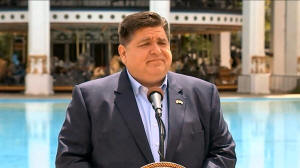COVID-19 Update: ‘Bridge’ phase to begin Friday as state seeks to
incentivize vaccination
 Send a link to a friend
Send a link to a friend
[May 14, 2021]
By JERRY NOWICKI
Capitol News Illinois
Jnowicki@capitolnewsillinois.com
 SPRINGFIELD – The state is opening
vaccinations to Illinoisans age 12-15, and a major theme park operator
is offering 50,000 free admission tickets in an effort to encourage
vaccination in that age group. SPRINGFIELD – The state is opening
vaccinations to Illinoisans age 12-15, and a major theme park operator
is offering 50,000 free admission tickets in an effort to encourage
vaccination in that age group.
That news came as the governor’s office confirmed the state will enter
the “bridge” phase of expanded reopening Friday amid decreasing
transmission rates, while first-time unemployment claims increased from
the prior week and continued claims dropped.
As of Thursday, more than 4.6 million Illinoisans – or 36.5 percent of
the state’s population – were fully vaccinated, with 10.1 million doses
administered statewide. Almost 58 percent of the state’s age 16-and-over
population had received at least one dose of the vaccine, according to
the Illinois Department of Public Health.
But the vaccination pace has slowed, with about 76,082 vaccine doses
administered on average daily over the previous seven days. That’s down
from a peak of over 130,000 daily in mid-April.

Gov. JB Pritzker said at a news conference at the Gurnee Six Flags Great
America location that incentives such as free tickets could nudge more
Illinoisans toward taking the vaccine.
“I think that there are people who, hearing that there's an incentive
knowing that it's easy to get vaccinated at a place like this or
somewhere near where you live,” Pritzker said. “There are an awful lot
of people out there that just haven't had time or they haven't had a,
you know, that extra little push to go get it done”
The state is sending Illinois National Guard mobile vaccination teams to
the Gurnee location on June 5 and 6, and the teams will return if
turnout is high. Six Flags will announce additional details in the
coming weeks, according to the governor’s office. As well, “a
significant portion” of the tickets will be distributed through local
health departments, with more information forthcoming on a
“county-by-county basis.”
Mobile teams are a key component of the state’s effort to target
vaccinations to hesitant or hard-to-reach communities. The Illinois
Department of Public Health said in a news release Wednesday it is also
enrolling pediatricians into the state immunization registry to allow
them to administer COVID-19 vaccines. As well, schools may partner with
the local health department or pharmacy to set up vaccination clinics
for students.
“We know that communities of color, unfortunately, have been less likely
to get vaccinated, we've tried to make it more available than ever
before… and of course there are people in rural communities where
transportation is more difficult,” Pritzker said. “So we've tried to
move mobile vaccination units into those communities, as well as into
more difficult neighborhoods across the state.”
Rep. Mike Zalewski, a Democrat from Riverside, is sponsoring a measure
he calls the “shot and a beer act” to incentivize those age 21 and older
to be vaccinated. That would allow Illinois bars to offer one free
alcoholic drink to a customer who can prove they are vaccinated.
“We think it will help overcome vaccine hesitancy,” Zalewski said in a
news conference Thursday, noting he was hopeful the measure could pass
before the May 31 adjournment of the General Assembly.
The U.S. Food and Drug Administration recently expanded the emergency
use authorization for the vaccine manufactured by Pfizer-BioNtech, and
the state announced Thursday vaccination sites would be ready to
vaccinate 12-15 year-olds this week.
According to health officials, the Pfizer-BioNTech vaccine was found to
be 100 percent effective in preventing COVID-19 among participants ages
12 through 15 years, and side effects were similar to those 16 years of
age and older, including pain at the injection site, tiredness,
headache, chills, muscle and joint pain, and fever.
[to top of second column]
|

Gov. JB Pritzker speaks at Six Flags Great America in
Gurnee Thursday to announce that the theme park will be giving away
50,000 free tickets to vaccinated individuals. (Credit:
Blueroomstream.com)

The bridge phase to full reopening that is set to
begin Friday would allow theme parks such as Six Flags and its
Hurricane Harbor water park locations to operate at 60 percent
capacity, up from 25 percent under Phase 4 guidelines.
Also on Thursday, the U.S. Centers for Disease Control and
Prevention released new guidance for masking which said fully
vaccinated people can stop wearing masks in most indoor and outdoor
locations, with exceptions for public transportation, planes,
hospitals, doctors offices and prisons.
In response, Pritzker tweeted, “I firmly believe in following the
science and will revise my executive orders in line with (CDC)
guidelines lifting additional mitigations for vaccinated people. The
scientists’ message is clear: if you are vaccinated, you can safely
do much more.”
The governor also said at the Thursday news conference that the
Chicago White Sox and Cubs will be adding sections in their
ballparks for those who are fully vaccinated in order to maximize
their allowable capacity. The capacity will increase to 60 percent
at each park later in the month as well.
Also in the bridge phase, restaurants and bars can increase capacity
from 25 percent to 30 percent, and outdoor capacity is allowed up to
50 percent for standing areas. As well, vaccinated people do not
count against capacity limits. The largest increase is to social
events, which can allow 250 people indoors and 500 outdoors.
Previously, those were capped at 50 people.
Pritzker’s office has said Phase 5, which is free of capacity
limitations, could happen as early as June 11 if transmission
numbers continue to decrease.
As of Thursday, the seven-day rolling average case positivity rate
for COVID-19 was 2.7 percent, down from a recent high of 4.4 percent
on April 12. Hospitalizations continued on a downward trend as well,
with 1,765 people hospitalized for COVID-19 at the end of Wednesday
night, a low since April 6.
Meanwhile, unemployment claims remained high, with 18,355 initial
claims filed the week ending May 8, a 21 percent increase from the
previous week. There were 216,176 unemployment weeks claimed for the
week ending May 8, a decrease of 5 percent from the week prior.
In a separate news conference Wednesday, Pritzker said he did not
plan to opt the state out of a federal plan that allows people on
unemployment to receive $300 extra per week in unemployment
compensation.

“Our job here is to make sure that we're creating jobs and helping
people to rebuild the lives that they had before, the pandemic,” the
governor said when asked about the extra $3000 payments. “And so
we're not going to pull the rug out from under people. What we are
going to do is make sure that we're creating promoting as many jobs
as possible and attracting people to those jobs.”
Capitol News Illinois is a nonprofit, nonpartisan
news service covering state government and distributed to more than
400 newspapers statewide. It is funded primarily by the Illinois
Press Foundation and the Robert R. McCormick Foundation. |